Tonight at St. Anselm College in New Hampshire, the three candidates vying for the Democratic Part's 2016 presidential nomination -- Bernie Sanders, Martin O'Malley and Hillary Clinton -- took the stage for a debate broadcast by ABC NEWS and moderated by Martha Raddatz and David Muir. Isaiah live cartooned the debate. He offered "What Bernie Wants for America"

He also offered "Who's Debate Is It Anyway?"

And he offered "Hillary's Debate Strategy."

Fact checking took place after the debate. The biggest liar?
Apparently Hillary Clinton. CNN offers:
Reality Check: Clinton on ISIS using Trump videos
By Kristen Holmes, CNN White House producer
Speaking
about Donald Trump's proposed ban on Muslims entering the United
States, Hillary Clinton said Saturday that ISIS was using video of the
businessman to recruit fighters.
"They
are going to people showing videos of Donald Trump insulting Islam and
Muslims in order to recruit more radical jihadists," Clinton said of the
GOP frontrunner during the third Democratic debate hosted by ABC.
It
is difficult to speak to all of ISIS's communication, some of which
happen in the open on social media sites but others hidden in what's
known as the "dark web."
While there
have been some tweets and comments posted on ISIS-supported social media
referencing Trump's rhetoric, according to information sent recently by
SITE Intelligence Groups, there is no evidence that ISIS itself has
released videos featuring Trump.
Neither
ISIS' main media outlets, nor any ISIS affiliates, have used footage
capitalizing on Trump's anti-Muslim language, according to Laith
Alkhouri, the co-founder and director of Flashpoint, a group that
monitors jihadist activity online. However, Alkhouri noted in comments
to CNN on Saturday that Trump's comments do play directly into the
recruitment playbook and he has no doubt eventually it could be
referenced in official ISIS communications.
Alkhouri
said the comments have also been mentioned in top tier ISIS web forums
in the dark web. Not too heavily discussed, but they were definitely
part of the "news feed, if you will," Alkhouri said.
The Clinton campaign directed CNN to an NBC News story published on December 8,
in which the executive director of the SITE Intelligence Group says of
ISIS: "They love him from the sense that he is supporting their
rhetoric."
"They follow everything
Donald Trump says," Rita Katz told NBC. "When he says, 'No Muslims
should be allowed in America,' they tell people, 'We told you America
hates Muslims and here is proof.' "
Ultimately, however, there is no evidence of ISIS using videos of Donald Trump for recruitment.
Verdict: False
Angie Drobnic Holan (POLITIFACT) also covered the claim:
"We also need to make sure that the really discriminatory messages that Trump is sending around the world don't fall on receptive ears," Clinton said. "He is becoming ISIS's best recruiter. They are going to people showing Donald Trump insulting Islam and Muslims in order to recruit more radical jihadists."
Not having heard that before, our eyebrows went up when we heard Clinton’s comment, and we weren’t alone. The Twittersphere, on both the right and the left, picked up on Clinton’s statement and questioned whether she had any evidence for it.
Extensive Google searches did not turn up any evidence. And the response from the Clinton campaign did not point to any specific videos.
The campaign pointed to an NBC News article that quoted Rita Katz of the SITE Intelligence Group, which monitors the social media activities of Islamic terrorist groups.
"They love him from the sense that he is supporting their rhetoric," she said. "They follow everything Donald Trump says. When he says, 'No Muslims should be allowed in America,' they tell people, 'We told you America hates Muslims and here is proof.' "
The article also quoted David Phillips, director of the Program on Peace-Building and Rights at Columbia University's Institute for the Study of Human Rights, saying that "Trump's incendiary anti-Muslim comments will surely be used by ISIS social media to demonize the United States and attract recruits to fight in Iraq and Syria."
But while such quotes support the notion that ISIS could be making recruiting videos, or will do so, they do not support Clinton’s contention -- offered in the present tense -- that they are currently doing so.
Vox.com tweeted at J.M. Berger, author of the book ISIS: The State of Terror, and Berger tweeted back, "I would be surprised if they had and we didn't hear about it in a big way."
For now, it seems that Clinton has turned speculative left-of-center rhetoric into fact. At PolitiFact, the burden of proof is on the person making the claim. We’ll update our fact-check in the event solid evidence emerges. But for now, that evidence does not exist. The Clinton campaign did not provide any evidence that this is already happening -- only that it could be happening, or that it may in the future. If ISIS was using Trump for recruitment videos, we would expect a frenzy of media coverage over it. We rated this statement False.
Glenn Kessler and Michelle Ye Hee Lee (WASHINGTON POST) also note the claim:
As evidence, the Clinton campaign pointed to an NBC News report quoting Rita Katz, executive director of the SITE Intelligence Group, which monitors social media activities of Islamic terrorist groups, that Trump’s anti-Muslim rhetoric was a great recruiting tool for ISIS.
“They love him from the sense that he is supporting their rhetoric,” Katz told NBC. “They love him from the sense that he is supporting their rhetoric.” She added: “They follow everything Donald Trump says. When he says, ‘No Muslims should be allowed in America,’ they tell people, ‘We told you America hates Muslims and here is proof.’”
But Katz did not specifically refer to a video, only to social media. We couldn’t immediately find evidence such a video yet existed.
From the transcript at THE WASHINGTON POST, we'll note this section of the debate on the Islamic State:
RADDATZ: Thank you. I do want to move to the fight against ISIS.
SANDERS: Yeah.
RADDATZ: For the people of New Hampshire, the brutality of ISIS is personal. James Foley grew up here. The first hostage, a journalist, brutally executed last year. You've all said ISIS is a ruthless enemy and must be stopped. Al Qaida as well.
Senator Sanders, you voted to send U.S. ground forces to fight in the coalition to help destroy Al Qaida in Afghanistan. Can you then explain you why don't support sending U.S. combat troops to join a coalition to fight ISIS?
SANDERS: And I also voted and helped lead the effort against the war in Iraq, which will go down in history as one of the worst foreign blunders -- foreign policy blunders in the history of our country.
I voted against the first Gulf War, which set the stage, I believe, for the second Iraq war. And what I believe right now, and I believe this is terribly important, is the United States of America cannot succeed, or be thought of as the policeman of the world, that when there's an international crisis all over the world, in France and in the U.K. Or -- hey, just call up the American military and the American taxpayers, they're going to send the troops.
And if they have to be in the Middle East for 20 or 30 years no problem.
RADDATZ: But why Al Qaida, why not ISIS?
SANDERS: I have a problem with that, Martha. What I believe has got to happen is there must be an international coalition, including Russia, a well-coordinated effort.
But I agree, as I mentioned a moment ago, with King Abdullah. This is a war for the soul of Islam. The troops on the ground should not be American troops. They should be Muslim troops. I believe that countries like Saudi Arabia and Qatar have got to step up to the plate, have got to contribute the money that we need, and the troops that we need, to destroy ISIS with American support.
RADDATZ: The administration has tried that over and over again. If it doesn't work and this threat is so great, what's your plan B?
SANDERS: My plan is to make it work, to tell Saudi Arabia that instead of going to war in Yemen, they, one of the wealthiest countries on Earth, are going to have to go to war against ISIS.
To tell Qatar, that instead of spending $200 billion on the World Cup, maybe they should pay attention to ISIS, which is at their doorstep.
(APPLAUSE)
RADDATZ: Secretary Clinton, you too have ruled out a large U.S. combat force, yet you support sending in special operations forces to Syria, and sending those 100 to 200 troops to Iraq to do exploitation kill raids.
We've already lost one Delta Force member in a raid. It has looked very much to me like we're already in ground combat on frequent trips I've made there.
So, are you fooling Americans when you say, we're not putting American combat troops back into Syria or Iraq?
CLINTON: No. Not at all. I think that what we're facing with ISIS is especially complicated. It was a different situation in Afghanistan. We were attacked from Afghanistan. Al Qaida was based in Afghanistan. We went after those who had attacked us.
What's happening in Syria and Iraq is that, because of the failures in the region, including the failure of the prior government in Baghdad, led by Maliki, there has been a resurgence of Sunni activities, as exemplified by ISIS. And we have to support Sunni-Arab and Kurdish forces against ISIS, because I believe it would be not only a strategic mistake for the United States to put ground combat troops in, as opposed to special operators, as opposed to trainers, because that is exactly what ISIS wants.
They've advertised that. They want American troops back in the Middle East. They want American soldiers on the ground fighting them, giving them many more targets, and giving them a great recruiting opportunity.
CLINTON: So, I think it's absolutely wrong policy for us to be even imagining we're going end up putting tens of thousands of American troops into Syria and Iraq to fight ISIS.
And we do have to form a coalition. I know how hard that is. I have formed them. I put together a coalition, including Arabs, with respect to Libya and a coalition to put sanctions onto Iran. And you have to really work hard at it.
And the final thing I would say, bringing Donald Trump back into it, if you're going to put together a coalition in the region to take on the threat of ISIS you don't want to alienate the very countries and people you need to be part of the coalition. And so that is part of the reason why this is so difficult.
(APPLAUSE)
RADDATZ: Secretary Clinton, I want -- I want to follow up on that. You do support sending special operations forces there. You support what the president has done already. One of the lessons people draw from Vietnam and war since is that a little force can turn into a little more and a little more. President Obama certainly didn't expect to be sending 30,000 additional troops into Afghanistan the first year of his presidency.
Are you prepared to run the risk of a bigger war to achieve your goals to destroy ISIS, or are you prepared to give up on those goals if it requires a larger force?
CLINTON: Well, I just think you're asking a question with a false choice. I believe if we lead an air coalition, which we are now in the position of doing and intensify it, if we continue to build back up the Iraqi army, which has had some recent success in Ramadi, as you know, if we get back talking to the tribal sheiks in Anbar to try to rebuild those relationships, which were very successful, in going after Al Qaida in Iraq, if we get the Turks to pay more attention to ISIS than they're paying to the Kurds, if we do put together the kind of coalition with the specific tasks that I am outlining, I think we can be successful in destroying ISIS.
So that's what I'm focused on, that's what I've outlined and that's what I would do as president.
RADDATZ: Governor O'Malley.
(APPLAUSE) You've emphasized the need for more human intelligence on the ground. What is it our intelligence community is not doing now that needs to be done?
O'MALLEY: Well, we have invested nowhere near what we should be investing in human intelligence on the ground. And what I'm talking about is not only the covert CIA intelligence, I'm also talking about diplomatic intelligence. I mean, we've seen time and time again, especially in this very troubled region of nation-state failures, and then we have no idea who the next generation of leaders are that are coming forward.
So what I would say is not only do we need to be thinking in military terms, but we do our military a disservice when we don't greatly dial up the investment that we are making in diplomacy and human intelligence and when we fail to dial up properly, the role of sustainable development in all of this. As president, I would make the administrator of USAID an actual cabinet member. We have to act in a much more whole of government approach, as General Dempsey said.
And I do believe, and I would disagree somewhat with one of my colleagues, this is a genocidal threat. They have now created a safe haven in the vacuum that we allowed to be partly and because of our blunders, to be created to be created in the areas of Syria and Iraq. We cannot allow safe havens, and as a leader of moral nations around this Earth, we need to come up with new alliances and new ways to prepare for these new sorts of threats, because Martha, this will not be the last region where nation-states fail.
And you've seen a little bit of this emerging in the -- in the African Union and the things that they have done to better stabilize Somalia. We need to pay attention here in Central America as well. So this is the new type of threats that we're facing and we need to lead as a nation in confronting it and putting together new alliances and new coalitions.
CLINTON: Well, I just want to quickly add...
RADDATZ: Thank you.
CLINTON: Martha, that -- you know,
I'm hoping that because of the very recent announcement of the agreement at the Security Council, which embodies actually an agreement that I negotiated back in Geneva in June of 2012, we're going to get a diplomatic effort in Syria to begin to try to make a transition. A no-fly zone would prevent the outflow of refugees and give us a chance to have some safe spaces.
RADDATZ: Secretary Clinton, I'd like to go back to that if I could. ISIS doesn't have aircraft, Al Qaida doesn't have aircraft.
CLINTON: I do not think it would come to that. We are already de-conflicting air space. We know...
RADDATZ: But isn't that a decision you should make now, whether...
CLINTON: No, I don't think so. I am advocating...
RADDATZ: ... if you're advocating this?
CLINTON: I am advocating the no-fly zone both because I think it would help us on the ground to protect Syrians; I'm also advocating it because I think it gives us some leverage in our conversations with Russia.
Now that Russia has joined us in the Security Council, has adopted an agreement that we hashed out a long day in Geneva three years ago, now I think we can have those conversations. The no-fly zone, I would hope, would be also shared by Russia. If they will begin to turn their military attention away from going after the adversaries of Assad toward ISIS and put the Assad future on the political and diplomatic track, where it belongs.
(CROSSTALK)
MUIR: I want to take this to Senator -- I'm going to take this to Senator Sanders next, because I think there...
(CROSSTALK)
SANDERS: I have a difference of opinion with Secretary Clinton on this. Our differences are fairly deep on this issue. We disagreed on the war in Iraq. We both listened to the information from Bush and Cheney. I voted against the war.
But I think -- and I say this with due respect --
Yes, we could get rid of Saddam Hussein, but that destabilized the entire region. Yes, we could get rid of Gadhafi, a terrible dictator, but that created a vacuum for ISIS. Yes, we could get rid of Assad tomorrow, but that would create another political vacuum that would benefit ISIS. So I think, yeah, regime change is easy, getting rid of dictators is easy. But before you do that, you've got to think about what happens the day after. And in my view, what we need to do is put together broad coalitions to understand that we're not going to have a political vacuum filled by terrorists, that, in fact, we are going to move steadily -- and maybe slowly -- toward democratic societies, in terms of Assad, a terrible dictator. But I think in Syria the primary focus now must be on destroying ISIS and working over the years to get rid of Assad. That's the secondary issue.
CLINTON: That is exactly...
MUIR: Senator, thank you.
CLINTON: That is exactly what I just said and what I just described.
MUIR: Yeah, but, Secretary Clinton -- Secretary Clinton...
CLINTON: And that is important, because now we have a U.N. Security Council that will enable us to do that. And, you know, with all due respect, Senator, you voted for regime change with respect to Libya. You joined the Senate in voting to get rid of Gadhafi, and you asked that there be a Security Council validation of that with a resolution.
All of these are very difficult issues. I know that; I've been dealing with them for a long time. And, of course, we have to continue to do what is necessary when someone like Gadhafi, a despot with American blood on his hands, is overturned. But I'll tell you what would have happened, if we had not joined with our European partners and our Arab partners to assist the people in Libya, you would be looking at Syria. Now the Libyans are turning their attention to try to dislodge ISIS from its foothold and begin to try to move together to have a unified nation.
SANDERS: I was not the secretary of state...
MUIR: Senator Sanders, Senator Sanders, hold on. One moment, please. I'm going to ask the secretary here, because there does appear to be some daylight here between the policies, at least in respect to when you take out Syrian President Bashar al-Assad. Right now or do you wait? Do you tackle ISIS first?
You have said, Secretary Clinton, that you come to the conclusion that we have to proceed on both fronts at once. We heard from the senator just this week that we must put aside the issue of how quickly we get rid of Assad and come together with countries, including Russia and Iran, to destroy ISIS first. Is he wrong?
CLINTON: I think we're missing the point here. We are doing both at the same time.
MUIR: But that's what he's saying, we should put that aside for now and go after ISIS.
CLINTON: Well, I don't agree with that, because we will not get the support on the ground in Syria to dislodge ISIS if the fighters there who are not associated with ISIS, but whose principal goal is getting rid of Assad, don't believe there is a political, diplomatic channel that is ongoing. We now have that. We have the U.N. Security Council adopting a resolution that lays out a transition path. It's very important we operate on both at the same time.
And let me just say a word about coalition-building, because I've heard Senator Sanders say this. I know how hard it is to build coalitions. I think it would be a grave mistake to ask for any more Iranian troops inside Syria. That is like asking the arsonist to come and pour more gas on the fire.
The Iranians getting more of a presence in Syria, linking with Hezbollah, their proxy in Lebanon, would threaten Israel and would make it more difficult for us to move on a path to have a transition that at some point would deal with Assad's future.
(CROSSTALK)
SANDERS: I happen to think...
O'MALLEY: I'd like to offer a...
(APPLAUSE)
MUIR: She says we have to proceed on both fronts at once.
SANDERS: Secretary Clinton is right. This is a complicated issue. I don't think anyone has a magical solution.
But this is what I do believe. Yes, of course Assad is a terrible dictator. But I think we have got to get our foreign policies and priorities right. The immediate -- it is not Assad who is attacking the United States. It is ISIS. And ISIS is attacking France and attacking Russian airliners.
The major priority, right now, in terms of our foreign and military policy should be the destruction of ISIS.
(APPLAUSE)
MUIR: Senator sanders, thank you.
O'MALLEY: May I offer a different generation's perspective on this?
MUIR: Governor O'Malley?
O'MALLEY: During the Cold War -- during the Cold War, we got into a bad habit of always looking to see who was wearing the jersey of the communists, and who was wearing the U.S. jersey. We got into a bad habit of creating big bureaucracies, old methodologies, to undermine regimes that were not friendly to the United States. Look what we did in Iran with Mosaddegh. And look at the results that we're still dealing with because of that. I would suggest to you that we need to leave the Cold War behind us, and we need to put together new alliances and new approaches to dealing with this, and we need to restrain ourselves.
I mean, I know Secretary Clinton was gleeful when Gadhafi was torn apart. And the world, no doubt is a better place without him. But look, we didn't know what was happening next. And we fell into the same trap with Assad, saying -- as if it's our job to say, Assad must go.
We have a role to play in this world. But we need to leave the Cold War and that sort of antiquated thinking behind.
MUIR: But -- you criticized -- you criticized Secretary Clinton for what came next. What's your proposal for what comes after Assad?
O'MALLEY: I believe that we need to focus on destroying ISIL. That is the clear and present danger. And I believe that we can springboard off of this new U.N. resolution, and we should create, as Secretary Clinton indicated, and I agree with that, that there should be a political process.
But we shouldn't be the ones declaring that Assad must go. Where did it ever say in the Constitution, where is it written that it's the job of the United States of America or its secretary of State to determine when dictators have to go?
We have a role to play in this world. But it is not the world -- the role of traveling the world looking for new monsters to destroy.
In TIME magazine's online poll, with 19,351 participants voting, 84% say Senator Bernie Sanders won the debate.
Friday, AFP reported, "Iraq's joint operations command said 10 Iraqi soldiers were killed or wounded on Friday by so-called friendly fire from US-led coalition aircraft west of Baghdad."
Not just from the US-led coalition aircraft, from a US war plane. US Secretary of Defense Ash Cater made that clear when speaking today on board the USS Kearsarge.
SECRETARY OF DEFENSE ASH CARTER: I just wanted to recap the last week. We've been to many of the locations from which this multi-axis attack on ISIL is going to be launched. As you know, I'm looking for ways to accelerate our campaign. We've identified a number of them in the course of travels to Iraq, to Turkey, even to Afghanistan yesterday. But this is a multi-mission trip, and this visit to the Gulf illustrates, first, the campaign against ISIL. I'll come back to that in the minute. But we can't forget there's a larger mission of deterrence, maintaining freedom of navigation, countering Iranian maligned influence. So these vessels here have a number of missions out here.
But countering ISIL is one of the reasons for our forces in this region. In that connection, it was very, very significant to me to be able to visit the Charles de Gaulle. That's the French vessel which has been participating in air strikes against ISIL, the first mission, and is now down here in the Gulf second mission, keeping the peace, deterring aggression, ensuring freedom of navigation here, during a period of time when there's not an American aircraft carrier here, there's a French aircraft carrier. And that shows you how close our cooperation is.
I had an opportunity this morning to speak to the French Defense Minister Le Drian, who allowed me to go aboard his vessel, and sadly wasn't able to be here himself. He's meeting with President Hollande at this moment in Paris, so he couldn't be here. But we talked this morning. And we are completely aligned with France on the mission of defeating ISIL, the need to do so in Syria and Iraq, France's willingness to do more as we do more, both in the air and on the ground and here at sea, and both militarily and politically, we and France are completely aligned.
And that's the way it should be. That's the way it has been. And I was very gratified to see that in action out aboard the Charles de Gaulle, which, by the way, is commanding Task Force 50 out here now. So it's -- no kidding, there are Americans who are subordinate to French command out here. That's how close our cooperation is.
So, with that, let me take your questions.
Q: Can you tell us about your call with the Iraqi prime minister?
SEC. CARTER: Oh, I'm sorry. I left that out. Yes. Yes, I also had the opportunity to speak to Prime Minister Abadi this morning. I was conveying our condolences on the loss of lives of Iraqi servicemembers last night. I explained to him our regrets, and he and I agreed that this was an event that we both regretted and that there would be an investigation of it, but that these kinds of things happen when you're fighting side-by-side, as we are, and we recommitted ourselves to that campaign against ISIL.
So this is a regrettable incident. We both know that. These things happen in war. And he and I both expressed regret over the incident and also determination to continue the campaign to expel ISIL from Iraqi territory.
Q: Was it an American...
STAFF: Hold on a second.
Q: Was it an American aircraft that did this?
STAFF: Let's go Missy first.
Q: Just a follow-up (inaudible) what do you know about the incident and how it occurred? And secondly, Prime Minister Abadi is already under pressure from some in the Iraqi political space who oppose American -- deepening American involvement in the campaign in Iraq. What's your response to the potential for this to increase that pressure on Prime Minister Abadi?
SEC. CARTER: Well, I wanted to assure Prime Minister Abadi that I was aware of this incident, that we regretted this incident. I don't want to go into it, because you never know whether you know all the facts of an incident from the beginning. But it has all indications of being a mistake of the kind that can happen on a dynamic battlefield between two forces, ours and Iraqi forces, that are working so closely together.
In a way, this is a sign of how closely we are working together. And an accident happened. It's tragic. I expressed our condolences. But he and I both recognize that things like this can happen in war.
Q: Yeah, but what about the political effect this could have in terms for Prime Minister Abadi who's already under pressure from some people who oppose the American military participation?
SEC. CARTER: Well, the government of Iraq and Prime Minister Abadi are committed, as we are, to an effective decentralized governance of a single state of Iraq, and that includes importantly the common mission of defeating ISIL. This shows the -- this incident shows that things happen in wartime, but also the closeness of our relationship on the battlefield, and then shared with Prime Minister Abadi, as well. And I hope Iraqis will understand that this is a reflection of things that happened in combat, but it's also a reflection of how closely we are working with the government of Prime Minister Abadi towards a common objective.
Q: So it was an American aircraft?
SEC. CARTER: It was an American -- that's the -- I want to be very careful. That's the information I have now. It seems to be the case and, again, seems to be a mistake that involves both sides, and regrettable. It happens when you're working this closely together.
Today, the US Defense Dept issued the following announcements on bombings of Iraq:
Strikes in Iraq
Attack, bomber and fighter aircraft conducted 17 strikes in Iraq, coordinated with and in support of the Iraqi government:
-- Near Fallujah, two strikes struck an ISIL tactical unit and destroyed two ISIL vehicles, four ISIL fighting positions, and an ISIL front end loader. One strike is currently under investigation for a potential friendly fire incident.
-- Near Kirkuk, one strike struck an ISIL tactical unit and destroyed an ISIL excavator and wounded ISIL fighters.
-- Near Makhmur, one strike struck an ISIL tactical unit and destroyed an ISIL light machine gun and an ISIL heavy machine gun.
-- Near Mosul, six strikes struck three separate ISIL tactical units and destroyed an ISIL heavy machine gun, two ISIL fighting positions, damaged an ISIL bunker, and suppressed an ISIL heavy machine gun and an ISIL mortar position.
-- Near Ramadi, four strikes struck an ISIL tactical unit and destroyed an ISIL vehicle borne improvised explosive device (VBIED), an ISIL building, nine ISIL fighting positions, an ISIL sniper position, an ISIL staging area, and denied ISIL access to terrain.
-- Near Sinjar, three strikes struck three separate ISIL tactical units and destroyed two ISIL heavy machine guns, and two ISIL fighting positions.
Task force officials define a strike as one or more kinetic events that occur in roughly the same geographic location to produce a single, sometimes cumulative, effect. Therefore, officials explained, a single aircraft delivering a single weapon against a lone ISIL vehicle is a strike, but so is multiple aircraft delivering dozens of weapons against buildings, vehicles and weapon systems in a compound, for example, having the cumulative effect of making those targets harder or impossible for ISIL to use. Accordingly, officials said, they do not report the number or type of aircraft employed in a strike, the number of munitions dropped in each strike, or the number of individual munition impact points against a target.
These bombings have gone on since August of 2014 and yet the Islamic State remains in Iraq.
Let's note Martin O'Malley again from tonight's debate:
O'MALLEY: Well, we have invested nowhere near what we should be investing in human intelligence on the ground. And what I'm talking about is not only the covert CIA intelligence, I'm also talking about diplomatic intelligence. I mean, we've seen time and time again, especially in this very troubled region of nation-state failures, and then we have no idea who the next generation of leaders are that are coming forward.
So what I would say is not only do we need to be thinking in military terms, but we do our military a disservice when we don't greatly dial up the investment that we are making in diplomacy and human intelligence and when we fail to dial up properly, the role of sustainable development in all of this. As president, I would make the administrator of USAID an actual cabinet member. We have to act in a much more whole of government approach, as General Dempsey said.
Despite US President Barack Obama declaring on June 19, 2014 that the only solution to Iraq's crises was a political solution, the White House has failed to use diplomatic power and resorted repeatedly to doing the same thing.
iraq
cnn




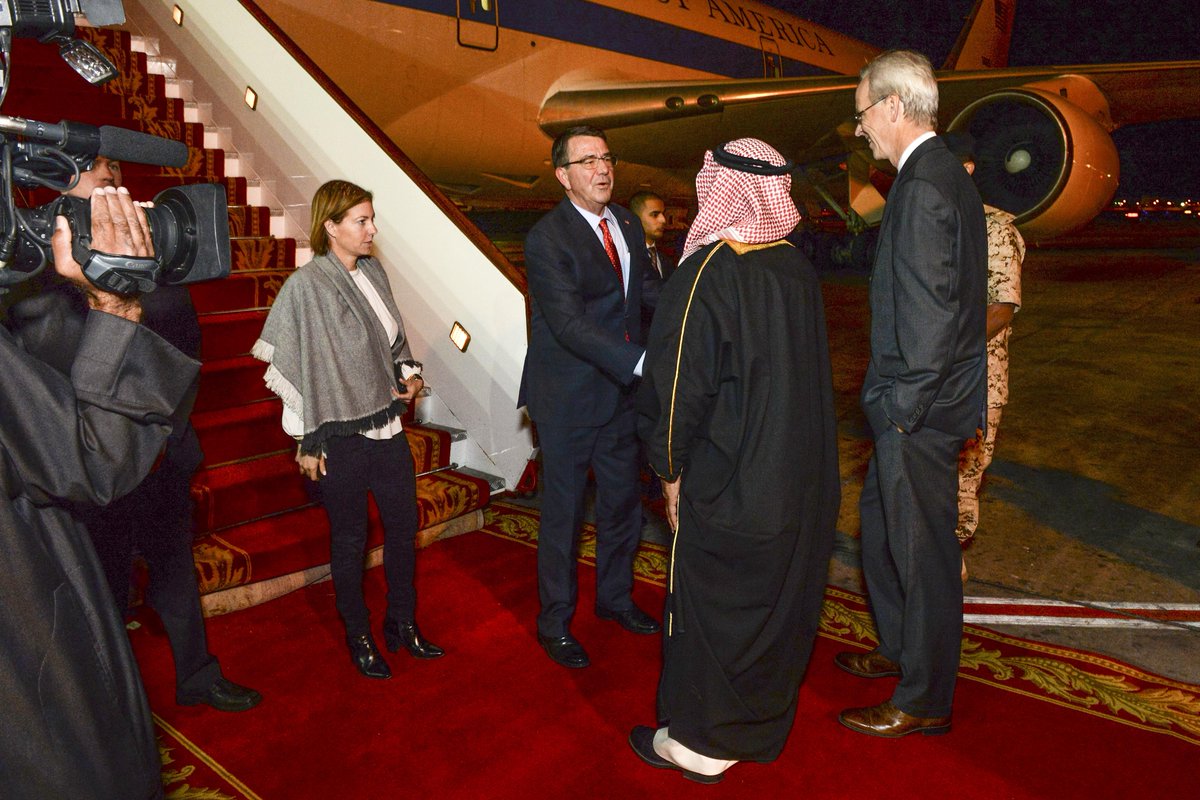
 U.S. Dept of Defense
U.S. Dept of Defense 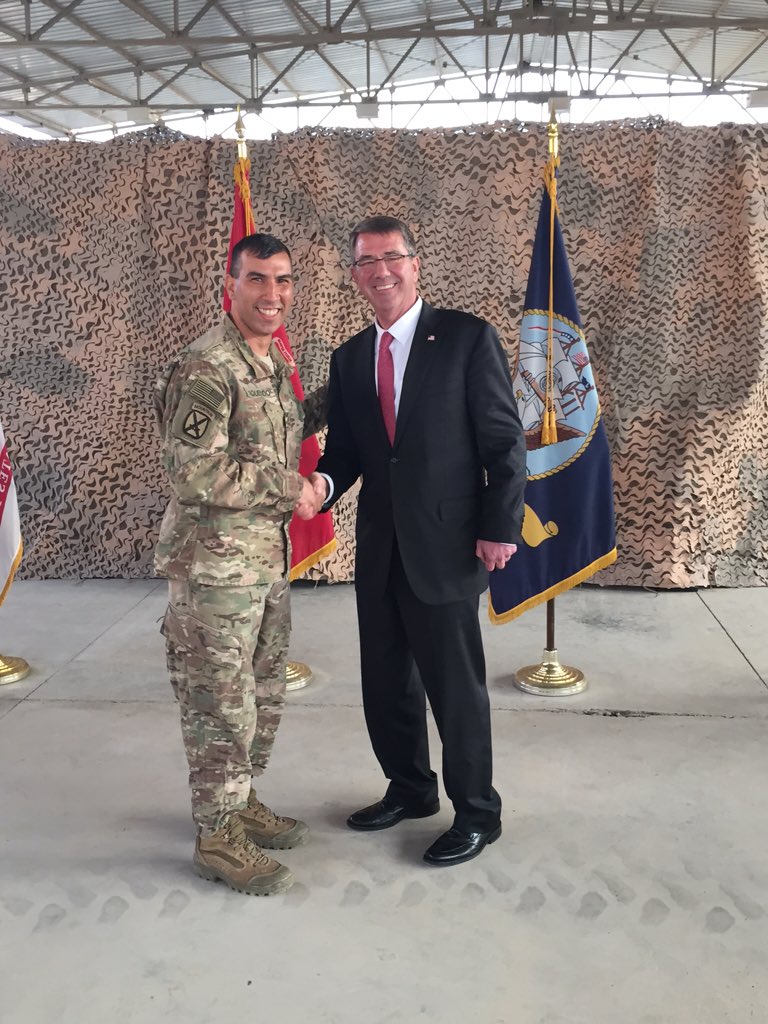

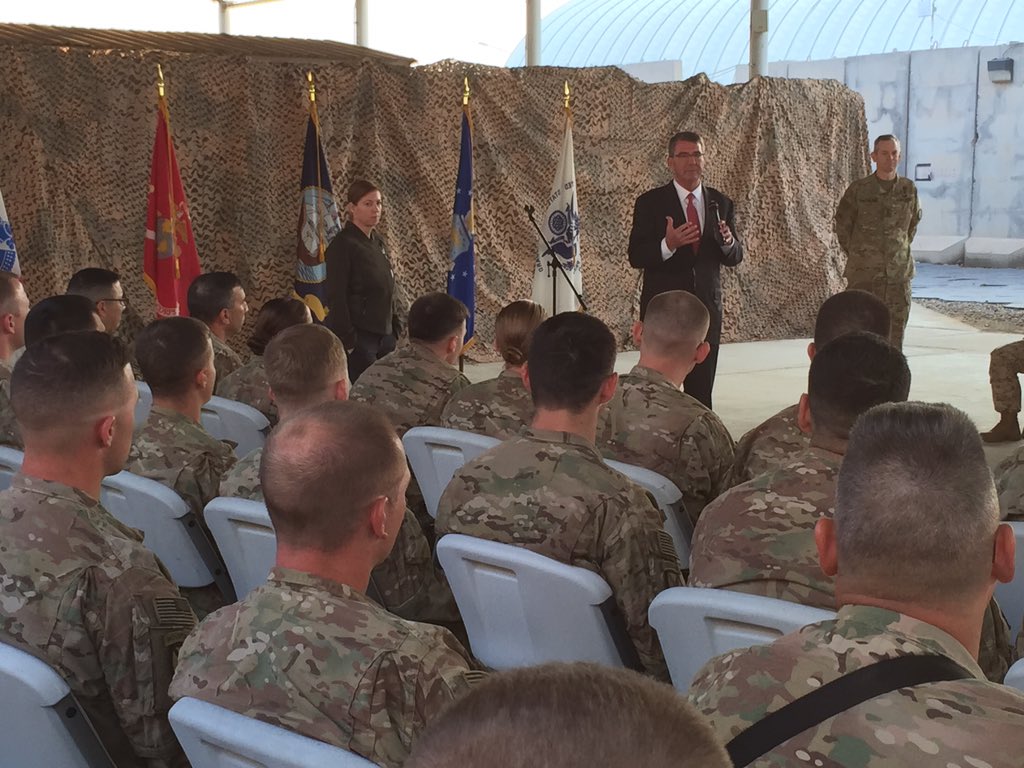

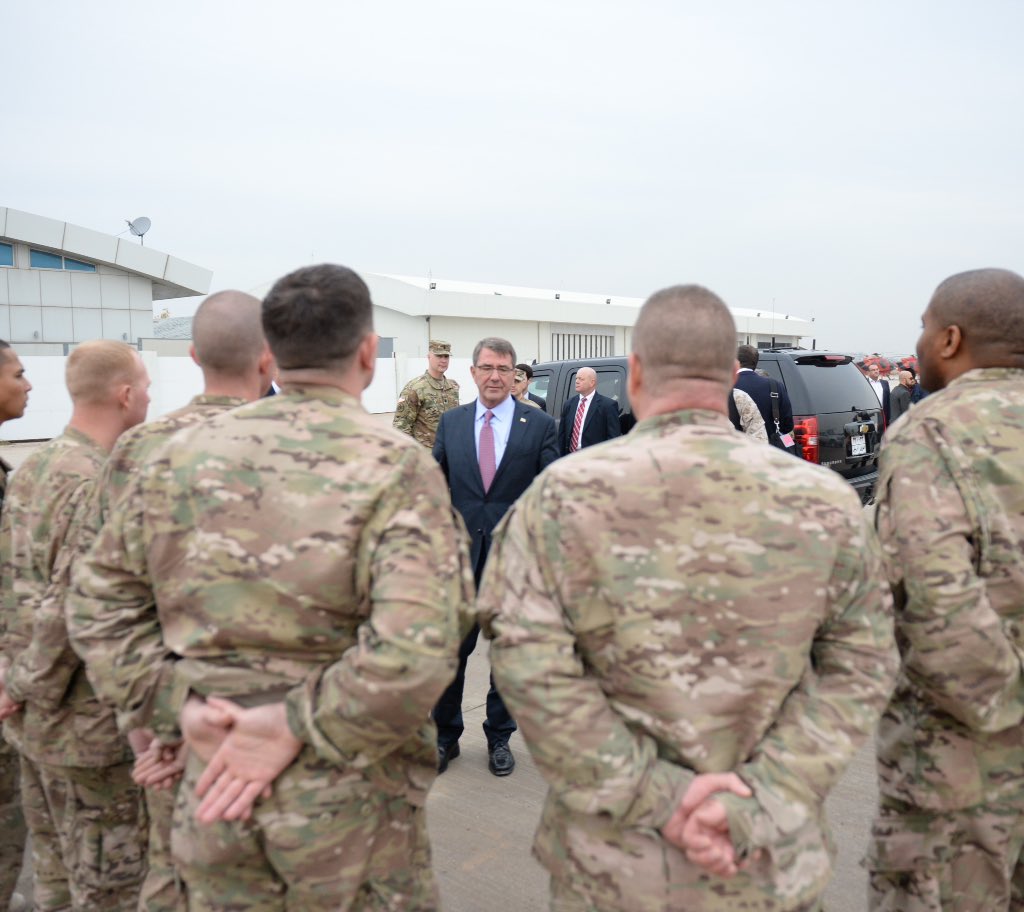
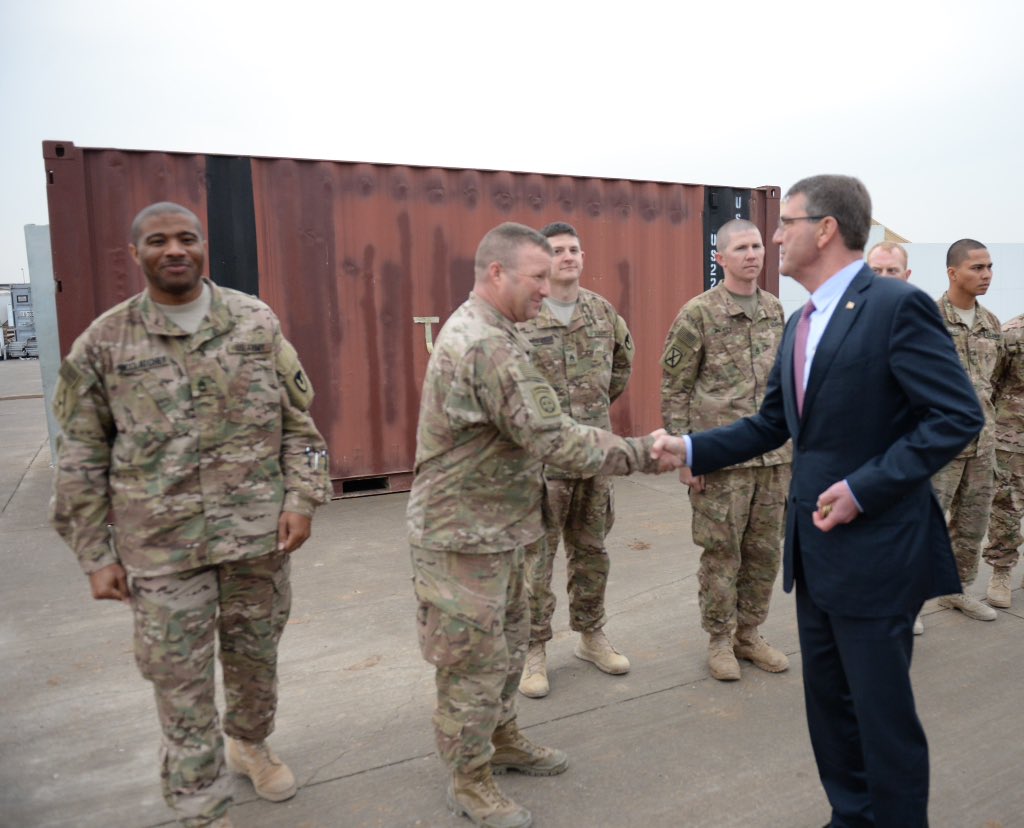
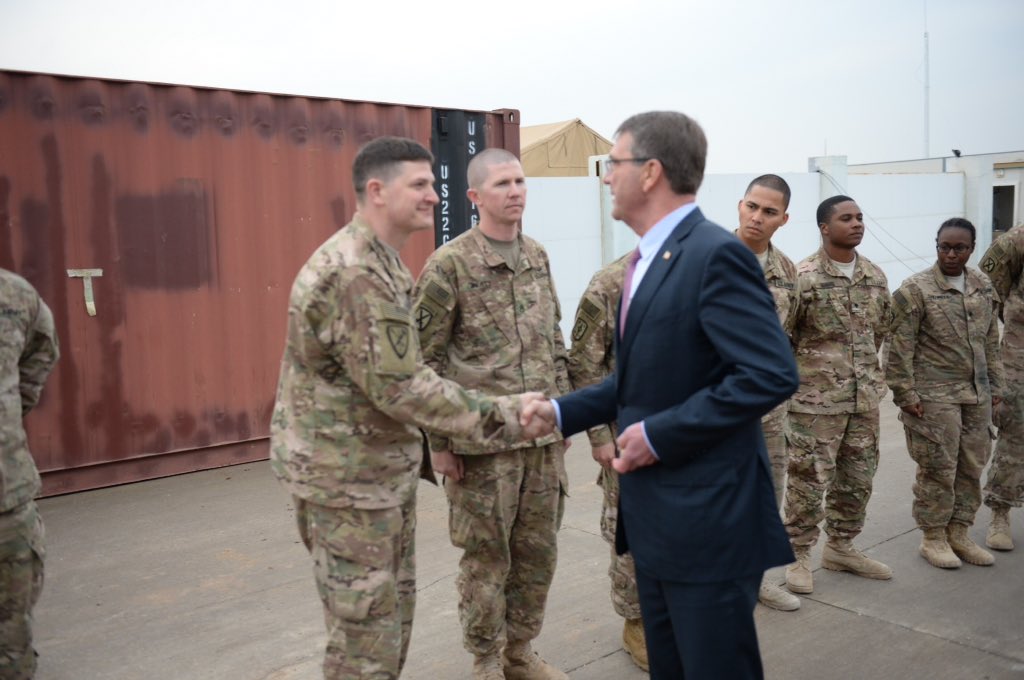
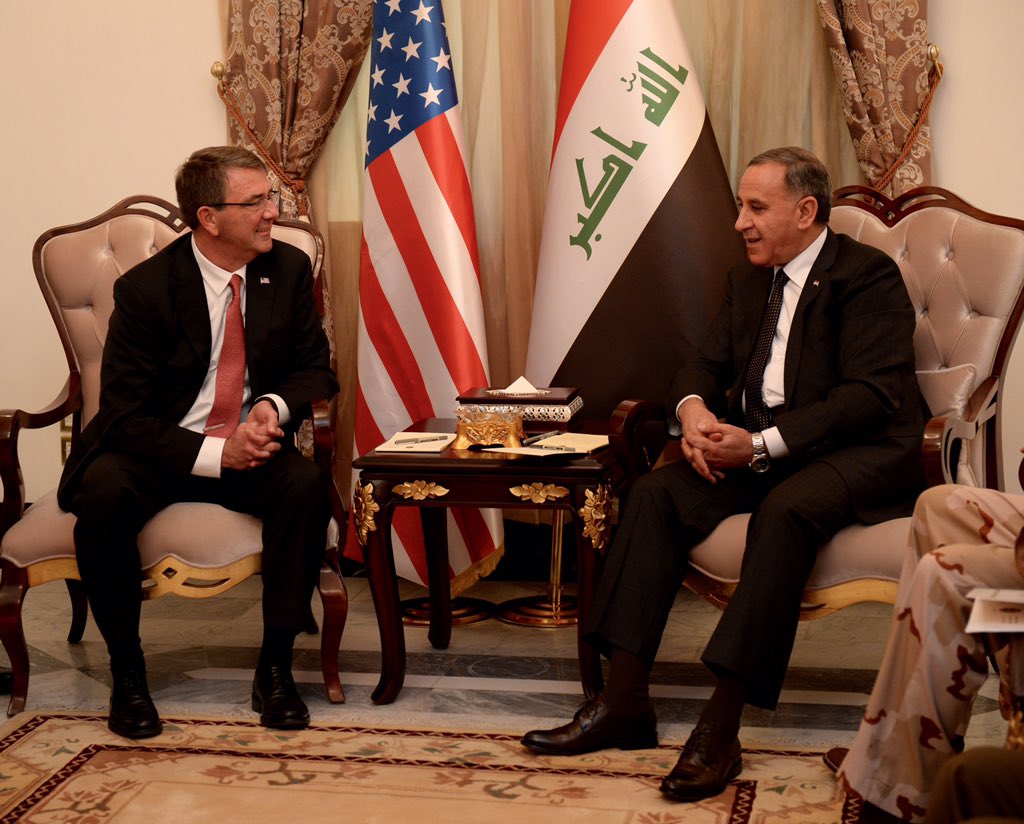
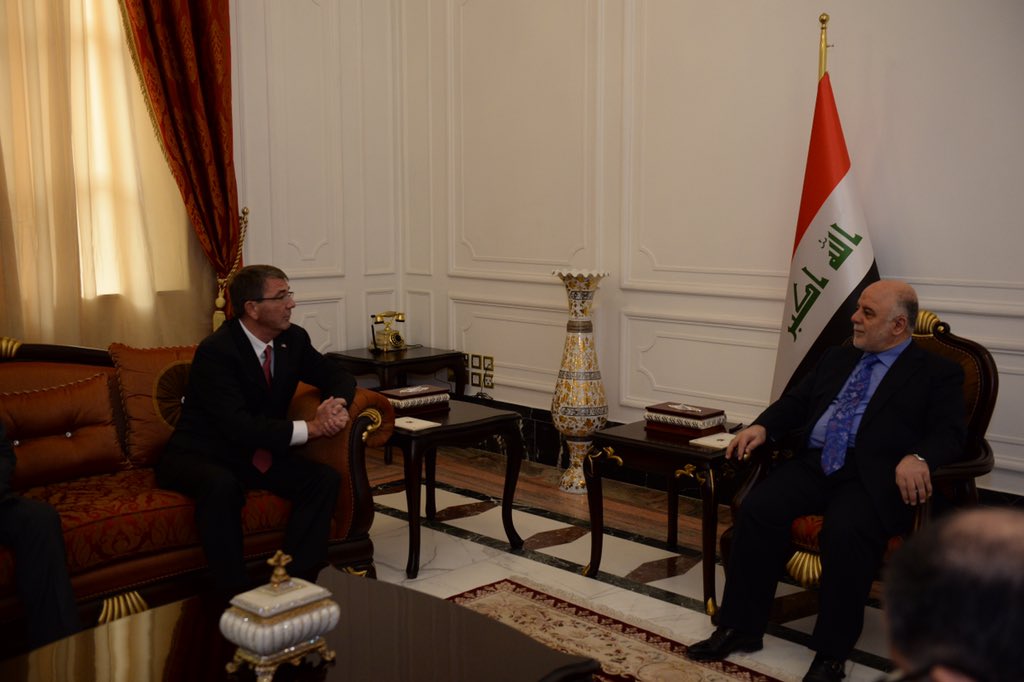
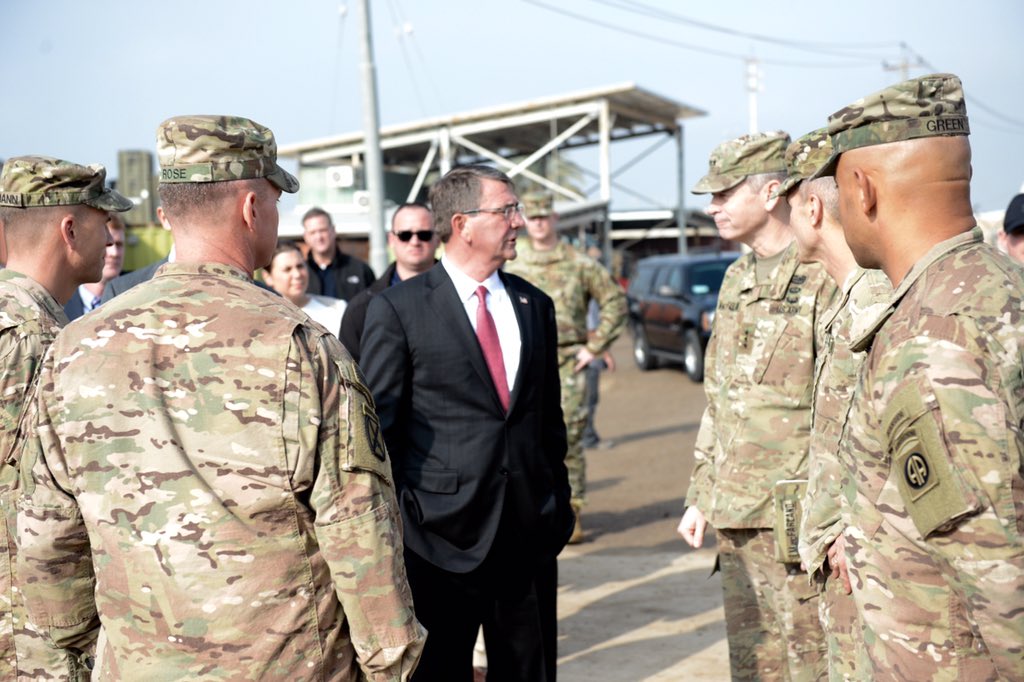
 Liz Sly
Liz Sly